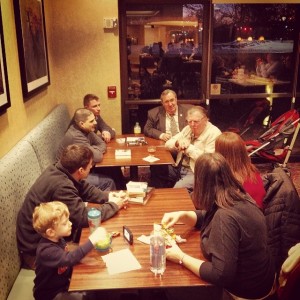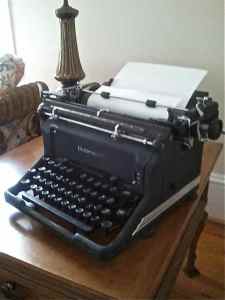Politics As Usual: A Town Hall Meeting to Address the Allegations of Criminal Neglect by the Veterans Affairs Health Care System
By Tom Kauffman, May 13, 2014

Recent allegations that the Phoenix Veterans Affairs hospital was derelict in its duties, resulting in the deaths of 40 patients, have attracted the eyes of veteran service organizations, politicians, and the media. A recent town hall meeting, co-hosted by Phoenix radio personality Mike Broomhead, was meant to address these allegations and others emerging in the wake of the Phoenix scandal.
“Thank you for coming today, we are here to get answers and table solutions ,” said Broomhead, a steadfast veterans advocate.
At issue was the “amount of time veterans have to wait to get the care they deserve and earned,” he asserted before polling the crowed. By a show of hands, he asked attendees how long they had waited for care at the Phoenix facility for 15 days, then 30 days, then 60, 90, 6 months, and 1 year or longer.
At the end of the survey, more than a few hands remained in the air.
Senator John McCain then took the stage, inviting four women to speak. They told stories of husbands and fathers dying while waiting for care, of dying due to substandard treatment.
One couldn’t help but notice the flurry of flashes and hear the clicks of cameras as reporters raced to record the more emotional moments.

“For a year my husband tried to get an appointment. They just kept telling him, ‘Be patient, sir. You have to be patient,’” claimed Vicki Olson, one of the grieving widows on the stage.
“My dead veteran husband cannot be much more patient than he is today. But me, I’m pissed.”
Senator McCain then made some points regarding the allegations of a secret “Death List.” He addressed reports of officials “cooking the books” in order to make it appear as if patients were receiving timely care.
He stopped short of calling for the resignation of Eric Shinseki, departing from the stance taken by several veteran service organizations as of late.
Instead, McCain took an easier stance, arguing that, if the allegations prove to be true, it will not be a matter of officials resigning, but a matter of officials spending time in jail. He then backed off on his rhetoric a bit, stating that investigations by the Inspector General can take months or even years.
Unfortunately, none of his words offered a solution to the ongoing problems of lengthy wait times and substandard care. Many veterans cannot afford to wait for things to change.
The only hint at a solution came when McCain proposed the idea of veterans choosing their own doctors: “Maybe we could have a card that would allow for reimbursement of outside care.”
However, he backtracked again, pointing out that the type of legislation requited to enact such a change would need to go through Congress. The blame was put on the system. Solutions would have to come from elsewhere.
McCain then opened the floor to the veterans in attendance. Emotional stories were followed by one pointed question in particular. “What are you going to do for veterans?” one veteran asked.
“I’ve helped [with] thousands of cases. You can see my record and ask my special team,” McCain replied.

“We’ve heard all this before,” the veteran added. “Sir, are you and your colleagues going to do the right thing for veterans?”
I was left with the impression that Senator McCain was doing little more than helping his constituents on an individual level—that he was doing his job, nothing more. After an hour, the floor was closed to veterans’ questions and comments. Nothing had been accomplished. No new ideas were presented. No leader emerged.
McCain, who is often, due to his military service and time spent as a Prisoner of War in Vietnam, touted as the federal government’s one representative aware of the sacrifices made by veterans, failed to prove himself as a leader.
After waiting for the national media to get their talking points and interviews, I calmly asked Senator McCain about his plans to reduce the number of veteran suicides. Citing current statistics, I made a point of letting him know, that during the course of the town hall meeting, it was likely that three veterans had taken their own lives.
“I’m not answering anymore questions.”
I am a veteran living with PTSD. And though there were many others in attendance who could’ve made the same claim, I was one of the few with a legitimate press pass, one of the few who’d been pre-approved for a chance to talk one on one with the senator. I felt insulted, shrugged off, ignored.
The senator instructed me to see his team of caseworkers to address any personal issues I’ve experienced with the VA. Perhaps, in the company I found myself in at that moment, it was unrealistic for anyone to assume that a veteran could be looking for a change that would go beyond self-interest. His refusal to answer my question seemed at odds with my experience of camaraderie and looking out for those brothers and sisters who’ve worn the uniform. I was looking for answers, not more lip service.
I was left with a sickening feeling. Because a politicians’ verbal maneuverings upstaged the true, heartfelt stories and cries for help of our veterans, it wasn’t hard to think that the event had been co-opted for political gain.
I spoke with one of the organizers after the event off the record. He, too left with the same sick feeling. Call it “posturing,” dilly-dallying,” or “lying” outright if you want. In the end, the town hall was little more than an exercise in rhetoric.
I had hope, at least, that the event would bring our issues to the attention of the national media.
Still, as of this morning, I hear nothing but crickets.



 through my mind besides the word ‘yes.’ It was an honor. I’d be able to meet a famous author, have my well-worn copy of his book signed, and perhaps pick his brain a little. I didn’t know just how meaningful it would be, though.
through my mind besides the word ‘yes.’ It was an honor. I’d be able to meet a famous author, have my well-worn copy of his book signed, and perhaps pick his brain a little. I didn’t know just how meaningful it would be, though.
